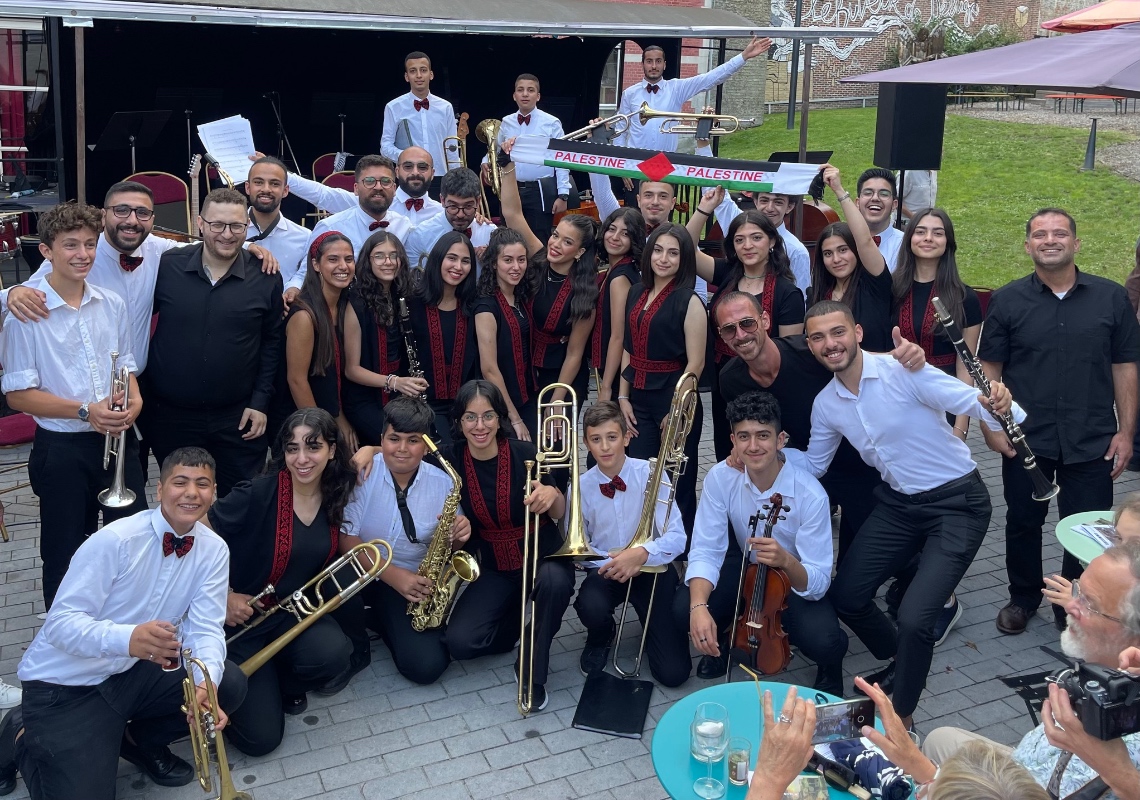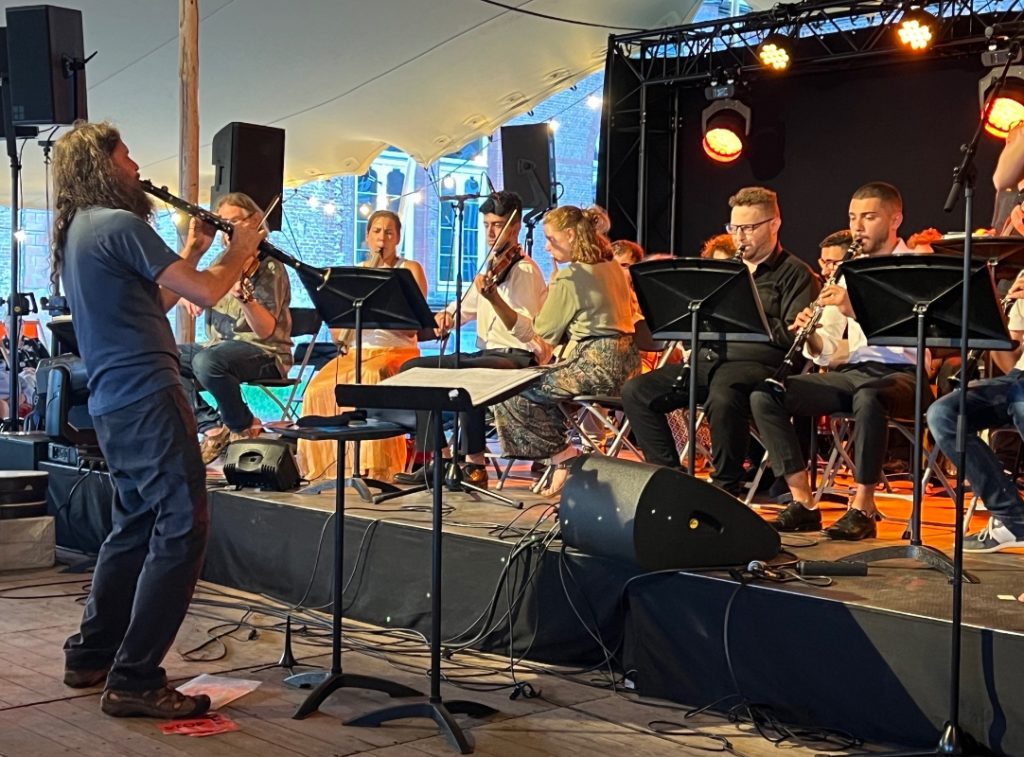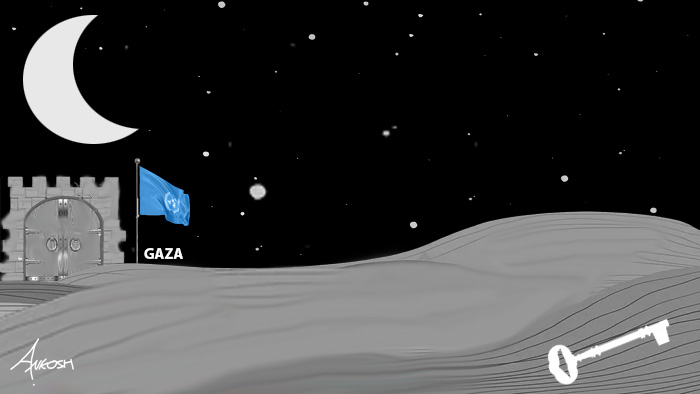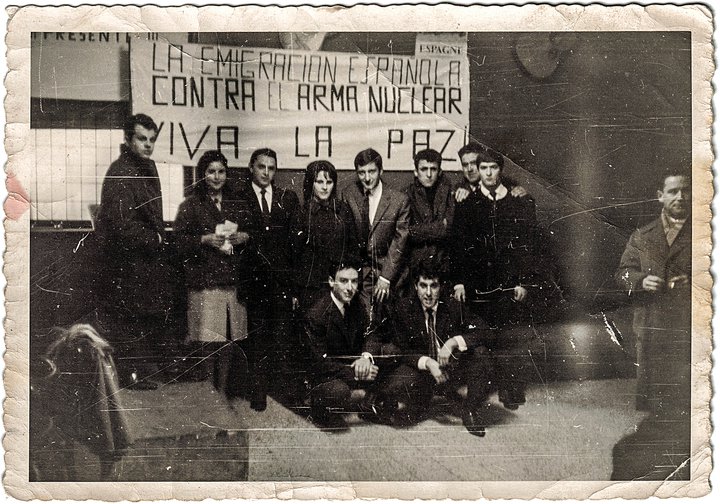From Palestine to Belgium, the Al Fanfardjâti band showcases brass and woodwind talents

The AL FANFARDJÂTI band was born from a collaboration between the Al Kamandjâti association and several Belgian cultural entities. Comprising one hundred young Palestinian musicians, this initiative has introduced and trained many Palestinian children in wind instruments - brass and wood - a departure from the more popular instruments in Palestine like piano, violin, and guitar.
Cet article a été rédigé avant les actuels terribles événements entre le Hamas et Israël.
The AL FANFARDJÂTI band was born from a collaboration between the Al Kamandjâti association and several Belgian cultural entities, including Casapalabre, ‘24 heures de Mouscron’, the Province of Hainaut, and Wallonie Bruxelles International. Comprising one hundred young Palestinian musicians, this initiative has introduced and trained many Palestinian children in wind instruments – brass and wood – a departure from the more popular instruments in Palestine like piano, violin, and guitar.
Ramzi Abu Redwan is the founder and manager of the Kamandjâti Association, which is dedicated to nurturing the Palestinian music scene. He explained : “Through establishing music institutes and schools in various Palestinian localities, including the towns of Ramallah, Jenin, Bani Zeid, and the Shatila and Qalandia refugee camps, Kamandjâti aims to enhance the Palestinian music scene with music schools, festivals, and integration with the Ministry of Education in Palestine. It further seeks to foster the music sectors and support budding artists.”
Regarding the AL FANFARDJÂTI band, Abu Redwan noted its foundation five years ago in partnership with Belgian institutions. This involved an exchange wherein Belgian music distributors and orchestra conductors visited Palestine to teach students to play wind instruments.
We’ve granted one hundred Palestinian youths the chance to delve into the realm of brass instruments.
“By enabling collective music performances, we’ve granted one hundred Palestinian youths the chance to delve into the realm of brass instruments, which weren’t commonly found in Palestine. These comprise the trumpet, trombone, baritone, French horn, tuba, and woodwinds like clarinet, flute, oboe, bassoon, and saxophone,” Abu Redwan continued.
“Such instruments feature in official and international events, and even symphony orchestras where compositions from greats like Beethoven are often played. The AL FANFARDJÂTI band has a unique allure, drawing more students due to its focus on folk songs.”
“We performed in seven Belgian cities under Maestro Montaser Jabrini’s guidance. The Belgian audiences were in awe, not just because mastering these instruments requires aptitude, but also due to the young artists’ impressive expertise, stemming from an Eastern culture. This initiative should persevere to cultivate and relay such talents to subsequent generations.”
The Palestinian national anthem on Belgian territory
Bono, 48, a resident of Tournai, one of Belgium’s ancient cities, reflected, “five years ago, we collaborated with the Al Kamandjâti Festival here in Belgium. We performed both French and Palestinian songs, often singing the Palestinian national anthem in refugee camps. Witnessing people’s emotions was heartwarming. Whenever we sing this anthem now, we aim to uplift and encourage the gifted children of Palestine.”
Marie, 56 years old, said, “five years ago, I went to Palestine with some Belgian musicians, and a small piece of my heart has been engraved with the name Palestine ever since. We believe that we should do something there, and indeed, we held many music concerts to raise money. With this money, we helped create music for the Palestinian Fringe team, which gave us a lot of emotions seeing these young Palestinian musicians creating something with so much love. We have been accompanying this band for the past three days in several cities in Belgium, and the surprise was their level of expertise in playing musical compositions on brass and wood instruments. We hope that this creativity continues, and we look forward to seeing them in the world’s largest theatres.”
As I settled into a diverse neighbourhood, my curiosity piqued over time.
Matias, the renowned clarinet player from the band LadyBirds, has forged a partnership with the AL FANFARDJÂTI team. Reflecting on his past, he said, “in my early twenties, I relocated to Ghent, a city northwest of Brussels. As I settled into a diverse neighbourhood, my curiosity piqued over time. I began wondering about the origins of my neighbours — which bands they were affiliated with and the languages they conversed in. This environment inspired the ethos of LadyBirds, a band that served as a bridge to myriad individuals, all drawn together by the shared aim of highlighting Palestine. Our ensemble was graced by the talents of a Palestinian artist, Hanin Washah, who introduced us to the rich tapestry of Arabic songs and Palestinian heritage melodies — a domain previously unfamiliar to me. Palestinian music, with its singular allure, has always captivated me. Alongside the Music Fund organisation, we’ve championed Palestinian music, furnishing budding talents with essential instruments.”

With continued enthusiasm, Matias added, “it was a profound honour to collaborate with the Kamangi group and the Fannfargati team, who arrived from Palestine to jointly celebrate and share Arab culture through music. We’re optimistic that this collaboration won’t be an isolated event.”
Belgium and woodwind instruments
The saxophone is considered one of the most important wind instruments. It is a cylindrical wind instrument belonging to the woodwind family, because it uses a single reed to make the sound. It was invented by the Belgian Adolphe Sax in 1840. The saxophone has a body with keys that can be controlled to produce different pitches. The keys are manipulated by the fingers, with the first three fingers of each hand controlling most of the keys. Some saxophones also have additional keys for specific purposes, such as trills.
There are several types of saxophones with varying sound characteristics, including the soprano saxophone, alto saxophone, tenor saxophone, and others. The saxophone was first used in orchestras in 1844, and many composers have written musical pieces for it.
The Palestinian musician, Mohammed Al-Loumani, from the Gaza Strip, who was supported by the founders of the Music Fund, emphasised the importance of his band’s presence in various cities across Palestine and giving the opportunity for its youth to showcase their creativity in these events when he collaborated with the AL FANFARDJÂTI Orchestra. He said, “it was a unique and new experience for us to participate with the AL FANFARDJÂTI Orchestra and with my friend the artist Khamis Abu Shaban. As we try to break the boundaries between us imposed by the Israeli occupation, today we all stand as Palestinians on one stage to promote musical culture in Palestine and introduce the European audience to how the playing of brass and woodwind instruments is developing. We witnessed great encouragement, applause, and significant interaction from the audience, which gave us the energy to be even more creative.”
We aim to demonstrate that despite the challenges posed by the Israeli occupation, we, as Palestinians, can thrive musically.
Meanwhile Rahaf Khader, a 15-year-old Palestinian clarinettist from Ramallah, described her journey, “nine years ago, I became a part of the Al Kamandjâti Association. They not only introduced me to both Eastern and Western instruments but also to music theory, notation, and its rich history. Today, performing here fills me with immense pride. We aim to demonstrate that despite the challenges posed by the Israeli occupation, we, as Palestinians, can thrive musically.”
“We want to convey the idea that we are like any independent country with music and diverse cultures, despite the Israeli occupation’s restrictions on many things. But today, here we are, meeting artists from Gaza as well, despite the barrier placed between us. We managed to present musical performances that we enjoyed, and they were well received by Western audiences.”
Would our voice echo globally ?
Qatr alNada, a 17-year-old from the Qalandia refugee camp, embodies the spirit of a musically inclined family skilled in violin and oud. Embarking on her inaugural journey beyond Palestine, she felt a profound joy despite a 24-hour travel ordeal. She explained : “Throughout the journey, I kept my eyes shut, guarding against discouragement. I envisioned myself on stage, delivering the performances we had honed over five years. Questions fluttered in my mind: Would our Palestinian voice resonate globally? Is music truly intertwined with our resistance? Would our performance resonate with audiences? Do we warrant continued support in our artistic endeavours? These questions found answers during our first performance in Belgium as part of a seven-show series. Witnessing the audience respond to our music, singing and cheering passionately for Palestine, I realised we had successfully showcased a unique Palestinian musical identity.”




